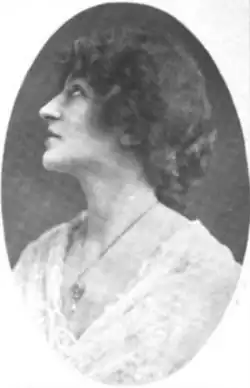Edith Ostlere
Edith Ostlere | |
|---|---|
 Edith Ostlere, from a 1908 publication | |
| Born | Edith Elizabeth Bury 12 August 1871 Surbiton, Surrey, England, U.K. |
| Died | 12 September 1931 London, England, U.K. |
| Other names | Robert Ord (pseudonym), Edith Lapthorne, Edith Gayer Mackay |
| Occupation(s) | Actress, playwright |
| Spouse | W. Gayer Mackay |
Edith Elizabeth Bury Gayer Mackay (12 August 1871[1] – 12 September 1931[2]), known as Edith Ostlere, was a British actress, writer, and playwright. She used the pseudonym Robert Ord.
Career
Ostlere's stage credits in Great Britain included roles in The Double Marriage (1888),[3] Paul Kauvar (1894),[4] A Gaiety Girl (1895),[5] One of the Best (1895–1896),[6] A Bunch of Violets (1896–1897),[7] The Seats of the Mighty (1896–1897),[8] The Baron's Wager (1897),[9] More than Ever (1897),[9] The King's Outcast (1899),[10] The Man in the Iron Mask (1899)[11] Kenyon's Widow, The Squire, A Fool's Paradise,[12] and Dr. Wake's Patient (1905–1906).[13]
Ostlere was also a writer. She wrote short stories, contributed a chapter to a collaborative novel in 1892,[14] and co-wrote a time-travel story, "The Heat Wave" (1929).[15] Using her pseudonym Robert Ord, she co-wrote several plays, including Dr. Wake's Patient (1904),[13] Barry Doyle's Rest Cure (1907),[16] The Port Arms (1909), A Midnight Visitor (1911), A Thief (1914), and The Prize (1915),[17] and co-adapted Gertrude Page's novel Paddy the Next Best Thing (1908) for the stage, with her husband, W. Gayer Mackay.[18][19]
Works
- A 'Novel' Novel: A Strange Story. Twenty Chapters by Twenty Authors (1892, contributor)[20][14]
- From Seven Dials (1898, short stories)[21]
- "The Perfidious Frenchman" (1902, short story)[22]
- Dr. Wake's Patient (1904, play, with W. Gayer Mackay)[13][17][23]
- The Knees of the Gods (1905, one-act play)[12]
- The Port Arms (1909, play, with W. Gayer Mackay)[17]
- A Midnight Visitor (1911, play, with W. Gayer Mackay)[17]
- A Thief (1914, play, with W. Gayer Mackay)[17]
- The Prize (1915, play, with W. Gayer Mackay)[17]
- "The Heat Wave: A Strange Story of Ancient Rome and Modern New York" (1929, story, with Marion Ryan)[15][24]
Personal life
Ostlere was born Edith Elizabeth Bury in Surbiton, Surrey, the daughter of Henry Cox Bury and Catherine Blanche Mousley Bury.[1] She married actor William Thomas Lapthorne in 1891.[25] They separated in 1897,[26] and divorced in 1906.[27] She married her writing partner, actor and playwright William Gayer Starbuck Mackay, in July 1907. He died in 1920,[28] and she died in 1931, in her sixties, in London.[2][29]
References
- ^ a b Howard, Joseph Jackson; Crisp, Frederick Arthur; College of Arms (Great Britain) (1893). Visitation of England and Wales. University of Michigan. [London] Priv. print. p. 115.
- ^ a b "East Kent News: Death of Mrs. Mackay". Dover Express. 1931-09-18. p. 10. Retrieved 2025-08-12 – via Newspapers.com.
- ^ de Mensiaux, Marie. "The Double Marriage" (review), The Theatre (1 August 1888): 92-93.
- ^ "Playbill advertising Mr Walter Sealby's company in 'Paul Kauvar'". Canfod, Glamorgan Archives UK. Retrieved 2025-08-12.
- ^ "Gaiety Girl 1895, Tour". Opera Scotland. Archived from the original on 2025-05-21. Retrieved 2025-08-12.
- ^ "Calendar for 1895-1896". The Adelphi Theatre Project. Archived from the original on 2025-04-28. Retrieved 2025-08-12.
- ^ "Edith Ostlere". Theatricalia. Retrieved 2025-08-12.
- ^ Parker, Gilbert (1986). Gilbert Parker and Herbert Beerbohm Tree stage " The seats of the mighty". Internet Archive. Toronto : Simon & Pierre. pp. 18–19. ISBN 978-0-88924-113-8 – via Internet Archive.
- ^ a b J.P. Wearing (1976). The London Stage 1890-1899 : A Calendar of Plays and Players. Internet Archive. The Scarecrow Press. pp. 691, 697.
- ^ Grein, Jack Thomas (1899). Dramatic Criticism. J. Long. pp. 289–290.
- ^ "'The Man in the Iron Mask'". Huddersfield Daily Examiner. 1899-09-12. p. 3. Retrieved 2025-08-12 – via Newspapers.com.
- ^ a b "Heard in the Green Room". The Sketch. 51 (658): 301. 6 September 1905 – via Internet Archive.
- ^ a b c Mackay, William Gayer; Ord, Robert (1909). Dr. Wake's Patient: A Comedy in Four Acts. Samuel French.
- ^ a b Bilston, Sarah (December 2022). ""The Most Extraordinary Novel of Modern Times": Collaborative Fiction in The Gentlewoman". Victorian Literature and Culture. 50 (4): 669–692. doi:10.1017/S1060150321000127. ISSN 1060-1503. Archived from the original on 2024-06-04. Retrieved 2025-08-12.
- ^ a b Dukes, Hunter. "Perspiration, Bilocation, and Plagiarisation: "The Heat Wave" (1929)". The Public Domain Review. Retrieved 2025-08-12.
- ^ "The Theatres: London's Busy Season". Manchester Evening News. 1907-08-17. p. 7. Retrieved 2025-08-12 – via Newspapers.com.
- ^ a b c d e f Who's who in the Theatre. Pitman. 1926. p. 719, 1097.
- ^ Wearing, J. P. (2014-03-27). The London Stage 1920-1929: A Calendar of Productions, Performers, and Personnel. Bloomsbury Publishing PLC. pp. 18, 263, 724. ISBN 978-0-8108-9302-3.
- ^ Wearing, J. P. (2014-05-15). The London Stage 1930-1939: A Calendar of Productions, Performers, and Personnel. Bloomsbury Publishing PLC. p. 81. ISBN 978-0-8108-9304-7.
- ^ Cozzi, Annachiara (2024-07-22). Late Victorian Literary Collaboration: Authorship, Co-Authorship and Popular Fiction. Liverpool University Press. p. 269. ISBN 978-1-83553-687-2.
- ^ "From Seven Dials" (review), The Outlook (October 22, 1898): 377.
- ^ Ostlere, Edith (October 1902). "The Perfidious Frenchman". The English Illustrated Magazine. 28 (229): 14–23 – via Internet Archive.
- ^ "At the Adelphi". The Bystander: 535. 13 September 1905.
- ^ Ryan, Marion; Ord, Robert (1929). "The Heat Wave: A Strange Story of Ancient Rome and Modern New York". Munsey's Magazine: 429–434 – via Internet Archive.
- ^ "Theatrical Divorce". Liverpool Echo. 1906-12-10. p. 7. Retrieved 2025-08-13 – via Newspapers.com.
- ^ "Bath Resitution Suit". The Bath Chronicle. 1906-07-26. p. 4. Retrieved 2025-08-13 – via Newspapers.com.
- ^ "Theatrical Divorce Case". Evening Express. 1906-12-10. p. 8. Retrieved 2025-08-13 – via Newspapers.com.
- ^ "William Gayer Mackay (death notice)". The Daily Telegraph. 1920-09-04. p. 1. Retrieved 2025-08-12 – via Newspapers.com.
- ^ "The Trustee Act, 1925, re Edith Elizabeth Gayer Mackay, Deceased (legal notice)". Dover Express. 1931-11-06. p. 6. Retrieved 2025-08-12 – via Newspapers.com.